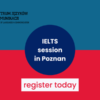
IELTS tests four language skills and consists of four parts – Listening, Reading, Writing and Speaking.
- Listening, Reading and Writing must be completed on the same day, with no breaks in between them. This lasts 2 hours and 45 minutes in total.
- Speaking test may be offered on the same day as the other sections of the test, or up to a week before or one day after. It lasts 10-14 minutes.
IELTS is available in two different types: Academic and General Training
How are the two tests different?
All test takers take the same Listening and Speaking tests but different Reading and Writing tests.
IELTS
Academic
Speaking
11-14 minutes
Assesses your use of spoken English. by face-to-face interview without disruptions or distractions.
Part 1 – the examiner asks you general questions about yourself and a range of familiar topics, such as home, family, work, studies and interests.
Part 2 – you are asked to talk for up to two minutes about a particular topic. You have one minute to prepare. Then the examiner asks one or two questions on the same topic.
Part 3 – you are asked questions about the topic in Part 2. These gives you the opportunity to discuss more abstract ideas and issues.
Important: Every speaking test is recorded. Your speaking test may be administered on the same day as the other sections of the test, or up to a week before or one day after. You will receive information about the session’s date 3 days in advance.
Reading
60 minutes
3 long texts taken from books, journals, magazines and newspapers, notices, advertisements, company handbooks and official documents. They have been selected for a non-specialist audience but are appropriate for people entering university courses or seeking professional registration.
The Reading section consists of 40 questions, designed to test a wide range of reading skills.
Writing
60 minutes
You write a table, chart or diagram (150 words) and a short essay (250 words).
Part 1 – you are presented with a graph, table, chart or diagram and asked to describe, summarise or explain the information in your own words.
Part 2 – you are asked to write an essay in response to a point of view, argument or problem.
Responses to both tasks must be in a formal style.
Listening
30 mins (+10 minutes to transfer responses to the answer sheet)
You listen to four recordings of native English speakers and then write your answers to a series of questions.
Part 1 – a conversation between two people set in an everyday social context.
Part 2 – a monologue set in an everyday social context, e.g. a speech about local facilities.
Part 3 – a conversation between up to four people set in an educational or training context, e.g. a university tutor and a student discussing an assignment.
Part 4 – a monologue on an academic subject, e.g. a university lecture.
IELTS
General Training
Speaking
11-14 minutes
Assesses your use of spoken English. by face-to-face interview without disruptions or distractions.
Part 1 – the examiner asks you general questions about yourself and a range of familiar topics, such as home, family, work, studies and interests.
Part 2 – you are asked to talk for up to two minutes about a particular topic. You have one minute to prepare. Then the examiner asks one or two questions on the same topic.
Part 3 – you are asked questions about the topic in Part 2. These gives you the opportunity to discuss more abstract ideas and issues.
Important: Every speaking test is recorded. The oral part may be conducted on the same day as other parts of the test or between 7 days before and one day after the written part. You will receive information about the date of the session 3 days in advance.
Reading
60 minutes
You read 5-6 short texts taken from books, journals, newspapers, magazines, notices, advertisements, company handbooks and guidelines. These are texts you are likely to encounter on a daily basis in an English-speaking environment.
The Reading section consists of 40 questions, designed to test a wide range of reading skills.
Writing
60 minutes
You write a letter (150 words) and a short essay (250 words).
Part 1 – you are presented with a situation and asked to write a letter requesting information, or explaining the situation.
Part 2 – you are asked to write an essay in response to a point of view, argument or problem.
Responses to both tasks must be in a semi-formal style.
Listening
30 mins (+10 minutes to transfer responses to the answer sheet)
You listen to four recordings of native English speakers and then write your answers to a series of questions.
Part 1 – a conversation between two people set in an everyday social context.
Part 2 – a monologue set in an everyday social context, e.g. a speech about local facilities.
Part 3 – a conversation between up to four people set in an educational or training context, e.g. a university tutor and a student discussing an assignment.
Part 4 – a monologue on an academic subject, e.g. a university lecture.
Important: Before booking your test, make sure to check which test you need with the organisations you are applying to.
FIND OUT MORE
Take IELTS at Centre of Languages and Communication of Poznan University of Technology
The IELTS session at Poznan University of Technology is open to everyone interested. A certificate that opens the door to international education and professional mobility.
IELTS One Skill Retake – improve your IELTS test score
IELTS One Skill Retake allows you to reattempt one of the four section of the test and improve your result without retaking the full test.
IELTS on computer – what it looks like?
Get familiar with taking IELTS on a computer . Try the demo version of the test and get familiar with the system on which you will take your IELTS.
IELTS session in Poznań
The IELTS session at Poznan University of Technology is open to everyone interested. A certificate that opens the door to international education and professional mobility.
IELTS Academic or General Training?
Which IELTS version should I choose – Academic or General Training? There are two different types of IELTS tests you can take: IELTS Academic and IELTS General Training. The test…
Who accepts IELTS?
IELTS is the most widely accepted test worldwide by more than 11,000 organisations (including top universities and institutions in over 140 countries with 3,000 in the USA alone). IELTS is accepted…
IELTS Test Security
Security Alert! Your success starts with IELTS. Don’t risk your future by cheating in any way. Please DO NOT: IELTS test results are used for admission to universities, colleges and…
Computer-delivered IELTS
Test takers at our Test Centre can choose to take their test: In both variants, the Speaking part takes place in traditional form, i.e. with a certified IELTS examiner for…








